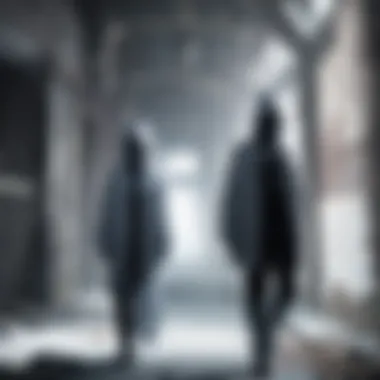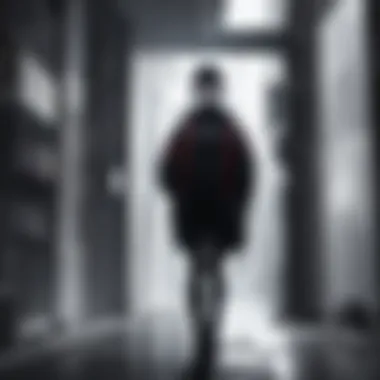Exploring Ghost Hunting in the Digital Age


Intro
Ghost hunting has evolved remarkably, especially in the digital era. What was once an underground fascination now holds a prominent place in mainstream media. Online platforms have democratized access to these eerie yet intriguing experiences, allowing curious minds to explore the supernatural from the comfort of their homes. This article will delve into this phenomenon, providing insights into how technology, streaming services, and community interactions shape modern ghost hunting.
Character Profiles
Overview of Main Characters
In ghost hunting shows, the characters often serve key roles that draw viewers in. Typically, the main characters are comprised of hosts or investigators who embody the curious yet skeptical spirit essential to paranormal exploration. These individuals often come from diverse backgrounds, bringing their unique perspectives and expertise. Popular figures like Zak Bagans from Ghost Adventures or Amy Bruni from Kindred Spirits exemplify this archetype, combining charisma and knowledge to enhance the viewing experience.
Supporting Characters
Supporting characters play a crucial role in these narratives. They may include local historians, paranormal experts, or even skeptics who provide balance to the main investigators' claims. Their input enhances the storytelling, offering layers of context and realism. The interplay between these characters often fuels the tension and drama that keeps audiences engaged.
Theme Exploration
Central Themes
Ghost hunting themes vary widely but frequently include curiosity, fear of the unknown, and the quest for understanding beyond death. These themes invite the audience to confront their beliefs about the afterlife and the nature of existence. The clash between science and superstition is predominant in many shows, allowing for rich discussions and debates about the validity of paranormal claims.
Cultural References
The cultural context plays a significant role in shaping ghost hunting narratives. Many shows tap into local folklore and historic events to lend credence to their investigations. These references not only enrich the story but also foster a connection with the audience. For instance, when urban legends are interwoven with actual investigations, viewers often find themselves more invested in the outcome.
Popular Series and Recommendations
Top Ghost Hunting Series
Several series stand out in the vast landscape of ghost hunting programming. For example, Ghost Adventures and Ghost Hunters have garnered massive followings. These shows feature a blend of intense investigations, personal anecdotes, and state-of-the-art technology. Their long-running nature has cemented their place in the genre, making them a must-watch for enthusiasts.
Hidden Gems in Online Streaming
Beyond the mainstream series, many lesser-known shows offer unique perspectives. The ParaPod and The Dead Files are examples that introduce different methodologies and storytelling techniques. Engaging with these hidden gems can provide viewers with fresh insights and a more diverse representation of ghost hunting culture.
In the digital landscape, ghost hunting has transformed from obscure pursuits into captivating narratives enjoyed by millions.
The accessibility of these series on platforms like Netflix and YouTube makes it easier than ever to delve into the world of the paranormal. As audiences increasingly engage with this genre, the growth of online forums and community interactions further enriches the experience. This growing digital community is a pivotal aspect of modern ghost hunting, contributing to both personal and collective investigations into the unknown.
Prolusion to Ghost Hunting
Ghost hunting has become a notable interest over the years, reflecting societal curiosity toward the supernatural. This article delves into that interest, mapping its path through time and modern technology. Understanding ghost hunting is essential, as it links historical beliefs with today’s digital culture, providing insights into how we engage with the paranormal.
Today's ghost hunting activities are heavily influenced by the media. The portrayal of ghost hunters on television and streaming platforms shapes public perception. This narrative influences not only how enthusiasts pursue their investigations but also what audiences expect from ghost hunting in various forms of media.
The benefits of examining ghost hunting include a deeper appreciation of its cultural significance and an understanding of the role technology plays in shaping experiences. In addition, discussing ghost hunting's history aids in recognizing its evolution and the trends that arise with new technologies. Overall, this introduction serves as a groundwork for exploring ghost hunting in a digital age, where accessibility to information and experiences is at an all-time high.
Historical Context
The origins of ghost hunting date back to ancient civilizations. Different cultures have interpreted encounters with the supernatural in various ways. From the spiritual rites of the Egyptians to folklore of spirits in European cultures, it is clear that humanity has long been fascinated with the idea of life after death.
In the 19th century, the spiritualist movement gained popularity in Europe and the United States. Séances and communication with spirits became common practices, fueling interest in investigating the paranormal. This period marked the beginning of more organized efforts to study ghost phenomena. Literature detailing these encounters emerged, setting the stage for future ghost investigations.
The rise of science in the 20th century introduced skepticism, thrusting ghost hunting into a realm of debate. Researchers attempted to apply scientific methods, leading to the development of various equipment aimed at detecting paranormal activity. Organizations dedicated to ghost research began forming, marking a significant shift toward a more systematic approach to ghost hunting.
Cultural Significance of Ghost Hunting


Ghost hunting is not just a hobby; it reflects a broader cultural phenomenon. In many societies, interest in the supernatural often parallels deeper fears and curiosities about the afterlife. Ghost hunting allows individuals to explore these themes in a tangible way.
Moreover, ghost hunting taps into collective memory. Many ghost stories originate from local folklore, preserving history and cultural identity. The sharing of such stories in ghost hunting activities fosters community bonds, allowing individuals to connect over shared experiences and beliefs.
In recent years, the portrayal of ghost hunting in media has shaped its cultural significance further. Television shows and online content have simplified the entry for many into the world of paranormal investigation, sparking a new wave of enthusiasts. These platforms not only entertain but also serve as educational tools, providing insights into techniques and cultural perceptions of ghost hunting worldwide.
Overall, ghost hunting reflects societal values, beliefs, and the quest for knowledge about what lies beyond. By understanding its cultural significance, one can better appreciate the enthusiasm surrounding ghost hunting in today’s digital landscape.
The Evolution of Ghost Hunting Media
The evolution of ghost hunting media is a critical component in understanding the current landscape of paranormal exploration. Over the decades, the way ghost hunting is represented in media has changed significantly. Each transformation has reflected broader cultural shifts and technological advancements. This development not only shapes how audiences perceive ghost hunting but also influences the practices within the field itself.
Early Television Programs
In the early days of television, ghost hunting was often presented as a casual exploration of the unknown. Shows from the 1970s, such as In Search Of, hosted by Leonard Nimoy, often focused on paranormal phenomena, including ghosts. These programs were rooted in mystery and often lacked the rigorous investigative techniques seen in later shows. The atmosphere was more about storytelling and less about scientific exploration. This lack of serious investigation was both a strength and a weakness. It engaged audiences with fascinating tales, but it did not foster a serious approach towards the paranormal.
The Rise of Reality TV in Ghost Hunting
The early 2000s marked a turning point with the rise of reality television and its intersection with ghost hunting. Ghost Hunters, launched in 2004, brought a new approach to the genre. This show integrated investigative methodology with a compelling narrative. The focus was on evidence collection using actual tools, like EMF meters and thermal imaging cameras. This shift in representation served to legitimize ghost hunting in the eyes of the audience. It transformed public perception of ghost hunting from mere entertainment to a more research-oriented activity. Other programs like Ghost Adventures followed the trend, adding a more intense cinematic style.
Influence of Streaming Platforms
As streaming platforms gained popularity, the ghost hunting genre experienced yet another transformation. Services like Netflix, Hulu, and YouTube broadened the availability of ghost hunting shows. Now, audiences can access countless explorations of the paranormal from the comfort of their homes. This has democratized the experience of ghost hunting.
Additionally, streaming platforms foster community engagement by allowing users to comment and discuss episodes in real-time. Viewers can share their thoughts and theories, which enriches the overall experience. Through social media sites like Facebook and forums on Reddit, fans interact not only with each other but also with creators, allowing for deeper discussions and added layers to their viewing experience.
The evolution of ghost hunting media illustrates the shifting paradigm in how we understand and approach the paranormal, reflecting both society's fascination and skepticism.
Technology in Ghost Hunting
In the realm of ghost hunting, technology plays a crucial role. As this field advances, so does the type of equipment and tools available to enthusiasts and professionals alike. Understanding these technologies enhances the overall experience and effectiveness of investigations. This section discusses the current technology, its impact, and its benefits within ghost hunting.
Equipment Used in Investigations
The range of equipment utilized in ghost hunting has significantly expanded with technological advancements. Some of the most common tools include:
- EMF Meters: These devices detect electromagnetic fields and are believed to help identify paranormal activity. Ghost hunters often carry these to identify locations with unusual energy fluctuations.
- Digital Audio Recorders: These are essential for capturing audio evidence during investigations. Enthusiasts often review recordings for possible Electronic Voice Phenomena (EVP), which are believed to be voices from the deceased.
- Infrared Cameras: These cameras allow hunters to film in low-light conditions. They help capture evidence that may not be visible to the naked eye, leading to potentially groundbreaking findings.
- Spirit Boxes: These devices scan through radio frequencies. Users believe they can communicate with spirits by interpreting the sounds and voices that emerge.
The effectiveness of these devices greatly depends on the user's knowledge of its functionalities and the environment in which they are used. The careful selection of equipment can mean the difference between a successful investigation and inconclusive results.
Role of Mobile Technology
Mobile technology has transformed ghost hunting. Many apps now available on smartphones offer functionalities once only possible with dedicated devices. For example, some apps simulate EMF meters and recording equipment. This accessibility empowers even amateur ghost hunters to participate.
Additionally, mobile devices can serve as powerful tools for documentation, enabling users to take notes, organize findings, and share experiences instantly on social media platforms. This immediacy enhances engagement and keeps the ghost hunting community active.
However, reliance on mobile technology brings challenges. The accuracy of information generated by apps can vary widely. Skeptics often question the validity of results obtained through non-specialized equipment. Thus, critical evaluation remains essential.
Data Analysis in Ghost Hunting
Data analysis represents a vital aspect of modern ghost hunting. As investigators gather substantial amounts of evidence through various devices, analyzing this data becomes necessary to draw meaningful conclusions. The process includes:
- Reviewing Audio and Visual Evidence: This can be time-consuming. Detailed examinations of recordings may reveal hidden or overlooked elements.
- Pattern Recognition: Investigators often look for recurring phenomena. Identifying patterns in evidence can lend support to claims of paranormal activity.
- Building Reports: Once data is analyzed, compiling reports assists in sharing findings within the community. This step paves the way for further discussions and collaborations.
Data analysis allows ghost hunters to transition from anecdotal experiences to systematic investigation, contributing to a broader understanding of the paranormal.


Watching Ghost Hunts Online
In the contemporary landscape of paranormal investigation, the act of watching ghost hunts online has gained significant traction. This phenomenon is not just a simple past-time but represents a shift in how audiences perceive and engage with paranormal activities. With the convenience of high-speed internet, fans of the supernatural can immerse themselves in these eerie experiences from the comfort of their homes. The accessibility to diverse content allows for a richer understanding of ghost hunting, varying from amateur explorations to high-profile investigations involving skilled teams.
The benefits of consuming ghost hunting content online are numerous. Viewers can analyze techniques used in investigations, heightening their appreciation for the complexity and challenges inherent in the field. Furthermore, watching these hunts can serve as a spark for curiosity, prompting audiences to explore further into both ghost hunting and the cultural narratives surrounding the paranormal.
Platforms for Streaming
Several platforms have emerged as hubs for ghost hunting content. Websites like YouTube and dedicated streaming services such as Discovery+ play a pivotal role in this niche. Content can vary widely, encompassing everything from reality shows to independent productions shared by enthusiastic ghost hunters. The diversity allows viewers to choose based on interests, whether they seek entertainment, education, or a compelling supernatural experience.
Some platforms also allow for live streaming of investigations, immersing viewers in real-time action. This feature not only enhances engagement but also enables interaction through chats and comments, fostering a sense of community among fans.
For those seeking structured and high-quality content, subscriptions to specific channels or services can provide access to curated ghost hunting material. This shift towards subscription-based models has transformed how paranormal content is disseminated and consumed.
Creating a Personalized Viewing Experience
In today’s digital age, personalizing one’s viewing experience is more straightforward than ever. Many platforms offer tailored recommendations based on viewing histories, which helps audiences discover new content that aligns with their preferences. This personalization plays a crucial role in maintaining viewer interest, leading to a deeper engagement with ghost hunting material.
Additionally, curated playlists or collections focus on specific themes, such as haunted locations or historical investigations. Audience members also have the option to create their own playlists, allowing them to curate a selection of preferred episodes.
Another important aspect of the personalized experience involves interaction with content creators. Many ghost hunters maintain active online presences across social media platforms like Facebook and Reddit, where they share insights and engage with fans directly. Such interactions foster a community around ghost hunting, enabling enthusiasts to exchange ideas, share experiences, and even collaborate on investigations.
"The internet has transformed ghost hunting from a few reality shows into a multi-faceted genre that can engage diverse audiences across the globe."
Engaging with the Ghost Hunting Community
In the realm of ghost hunting, engagement with the community can significantly enhance the experience for enthusiasts and newcomers alike. The online world has fostered a space where individuals can share their findings, experiences, and questions related to paranormal phenomena. This engagement not only creates a supportive environment but also cultivates a culture of knowledge sharing.
Active participation in ghost hunting discussions can help individuals refine their investigative techniques and understand the evolving nature of the community. Additionally, connecting with like-minded individuals can lead to collaborations on ghost hunts, content creation, and research on paranormal topics. Such interactions can be crucial in building a sense of belonging within a field that may otherwise seem esoteric or niche.
Online Forums and Fan Communities
Online forums have become a cornerstone for ghost hunting enthusiasts. These platforms allow users to exchange insights, report experiences, and post questions to a diverse audience. Reddit, for example, hosts various threads dedicated to ghost stories, equipment reviews, and investigation techniques, such as r/Ghosthunters and r/Paranormal. These forums are valuable for newcomers seeking guidance or advice on getting into the practice. Users can find credible information and diverse opinions that can lead to forming their own understanding of the paranormal.
In fan communities, discussions often extend beyond mere reporting of experiences. Members often share tips on using different types of equipment, from EMF meters to thermal imaging cameras. The ability to ask questions and receive feedback from others who have hands-on experience with these tools can be incredibly beneficial.
Contributing to Online Discussions
Contributing to online discussions goes beyond just participating; it involves sharing knowledge and insights that can aid others. For those experienced in ghost hunting, posting detailed accounts of investigations can inspire and educate newer members. Contributing original content, such as articles or videos about techniques or findings, greatly enriches the community.
Moreover, facilitating discussions that encourage critical thinking about ghost hunting methods and ethics fosters a culture of thoughtful engagement. By promoting evidence-based discussions, enthusiasts can challenge misconceptions and elevate the discourse surrounding ghost hunting practices.
Ultimately, active involvement in the ghost hunting community online offers numerous benefits. It aids personal growth, enhances knowledge, and fosters connections. As the landscape of ghost hunting evolves, such engagements will help shape its future, ensuring it remains a vibrant and respected field both online and offline.
Cultural Impact of Ghost Hunting
The influence of ghost hunting extends beyond mere entertainment; it reflects societal beliefs and cultural narratives surrounding the supernatural. This section seeks to explore how ghost hunting has shaped, and has been shaped by, cultural attitudes toward the paranormal. Understanding these dynamics allows us to appreciate the significance of ghost hunting in both media and community discourse.
Perception of the Paranormal
Perception of the paranormal is often influenced by various factors including media representation, personal experiences, and cultural background. Ghost hunting shows, such as Ghost Adventures and The Dead Files, have contributed significantly to popular beliefs about ghosts and the afterlife. They often depict a blend of intrigue and fear, framing spirits as either remnants of the past or as harbingers of mystery.
Many viewers find reassurance in the idea that there is life after death. Others become skeptics due to unclear evidence presented on-screen, challenging their beliefs. This creates a duality: ghosts become both a source of comfort and a cause of anxiety.
The rise of digital platforms has facilitated access to various ghost hunting content, allowing individuals to explore their own perceptions. Online communities serve as spaces for discussion, debate, and validation of experiences with the paranormal.


"Ghost hunting allows individuals to confront their fears and curiosities about mortality and existence."
Ghost Hunting and Folklore
Ghost hunting is deeply intertwined with folklore, acting as a modern lens through which traditional stories are examined. Many ghost hunting narratives draw heavily from local legends and historic accounts of hauntings, effectively renewing interest in cultural stories.
Investigative programs often highlight places with rich histories, many of which are deeply rooted in regional folklore. For example, The Winchester Mystery House draws countless visitors intrigued by its complex history and ghostly tales. Thus, ghost hunting not only serves entertainment purposes but also acts as a preservation of folklore and history.
In this context, ghost hunting acts as a bridge connecting past narratives with contemporary exploration. The blending of traditional folklore with modern ghost hunting practices creates a unique cultural significance, enhancing our understanding of both.
Through these perspectives, we can see that ghost hunting is not a fleeting trend; it holds lasting cultural value, intertwining with human curiosity about the unknown. This acknowledgement of ghost hunting's role helps us comprehend how societies construct their perceptions of the paranormal.
Critical Perspectives on Ghost Hunting
The discourse surrounding ghost hunting encompasses a variety of viewpoints, significantly enriching the overall narrative of this practice. Critical perspectives play a vital role in discerning the genuine from the sensational and provide a structured understanding of the complexities associated with the paranormal investigations. Addressing skepticism and ethical practices within the realm of ghost hunting not only aids in shaping community standards but also cultivates a more educated audience.
Evaluating these perspectives helps in understanding the wide-ranging implications ghost hunting holds in culture, media, and the individual psyche. Highlighting these aspects sheds light on the necessity for a balanced view, ensuring that entertainment does not overshadow rational discourse.
Skepticism in Ghost Hunting
Skepticism is a significant part when discussing ghost hunting. The critical analysis of claims supported by anecdotal evidence can encourage a more rigorous examination of what is presented. Skeptics argue that many supposed paranormal activity occurrences can be explained through psychological, environmental, or technological factors.
The importance of skepticism includes:
- Questioning Authenticity: Challenging fantastic stories encourages deeper investigation into the facts.
- Fostering Realism: By questioning the narratives, it allows enthusiasts to maintain a level of realism in their explorations.
- Encouraging Open Debate: Skepticism invites discussion, allowing for diverse opinions, ranging from believers to outright deniers.
A balanced approach toward skepticism can help fans and practitioners measure the veracity of their experiences adequately. It is not just about denying or confirming but understanding the root of the narratives surrounding ghost hunting.
Ethics of Ghost Hunting Practices
Ethical considerations in ghost hunting are crucial in maintaining the integrity of the community. Investigators often find themselves grappling with the moral implications of their actions, especially when dealing with the historical or culturally significant sites.
Essential ethical aspects include:
- Respect for Locations: Trampling through sensitive sites without permission can lead to severe consequences on a cultural level.
- Informed Consent: Engaging property owners and inhabitants before conducting investigations is fundamental in ghost hunting.
- Honesty in Portrayal: Presenting findings accurately is vital for the credibility of the entire field.
Ethical ghost hunting fosters a sense of trust and respect among practitioners, the community, and the locations involved.
Understanding these ethical boundaries assists in determining acceptable norms for ghost hunting practices, ensuring that the activity remains respectful and insightful.
Epilogue of Critical Perspectives
In sum, critical perspectives—especially skepticism and ethics—serve as cornerstones fostering a deeper understanding of ghost hunting in the digital age. By considering these viewpoints, enthusiasts can engage more meaningfully with the craft they love.
Finale
The importance of analyzing the future of ghost hunting entertainment lies in understanding its potential directions and impacts. As technology evolves, so too will the ways in which audiences experience and engage with ghost hunting content. This focus on the future considers factors such as emerging technologies, changing viewer preferences, and cultural shifts in how the paranormal is perceived.
The Future of Ghost Hunting Entertainment
One key aspect to consider is the rise of virtual reality (VR) and augmented reality (AR) in the genre. With advancements in VR equipment, audiences could potentially step into ghost hunting scenarios, experiencing the thrill of exploring haunted locations in an immersive way. Platforms like Oculus Quest may bring such experiences to life, connecting viewers more intimately with the content.
Another trend is the growing role of interactive storytelling, which invites audiences to participate in the narrative. This could allow viewers to choose investigation paths or make decisions that impact the storyline in real-time. This interactive element could enhance engagement, encouraging a deeper connection between fans and the ghost hunting community.
In addition, the influence of social media will continue to shape ghost hunting's reach. Platforms such as Reddit and Facebook serve as hubs for discussion and sharing. The community thrives on user-generated content, and as more content becomes accessible, new voices will rise, perhaps even democratizing ghost hunting expertise.
"As viewers become creators, the lines between audience and producer blur, fostering a richer dialogue within the ghost hunting sphere."
Finally, documentary-style approaches may further dominate. Audiences increasingly seek authenticity and education within entertainment. This could lead content creators to focus more on factual storytelling, incorporating history and research alongside traditional ghost hunting narratives.
In summary, the future of ghost hunting entertainment will likely be shaped by technological advancements, the seeking of immersive experiences, and the engagement of community and audience voices. As the field evolves, it remains vital to keep considering these developments, ensuring that the allure of discovering the unknown continues well into the future.







